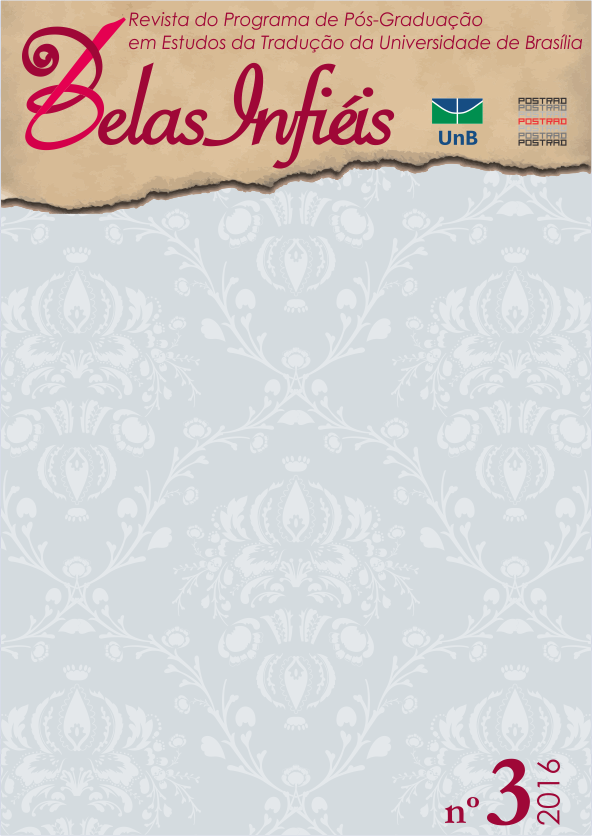EL POETA-TRADUCTOR SILVA ESTRADA:
LA VOZ DE LA LÍRICA FRANCESA EN LA LITERATURA VENEZOLANA
DOI :
https://doi.org/10.26512/belasinfieis.v5.n3.2016.11396Mots-clés :
traducción literaria, literatura venezolana, escritores y traductores de LatinoaméricaRésumé
Este artículo analiza la traducción literaria del poeta Alfredo Silva Estrada (1933-2009) en el sistema literariovenezolano. A partir de la teoría de los polisistemas de Itamar Even- Zohar (1999) se señala la función de la literatura traducida en el contexto de producción de la obra del escritor para posteriormente reflexionar de acuerdo con los postulados de André Lefevere (1945-1997) acerca de las relaciones entre la poesía traducida de Silva Estrada y las demandas de las editoriales nacionales. Por consiguiente, se demuestra que el latinoamericano cultivó una poética de la traducción que lo emparenta con la transcreacion de Haroldo de Campos (1929-2003) y con los principios teóricos de Octavio Paz (1914-1998), lo que manifiesta que Silva Estrada también representa la figura del traductor-creador que escribe, lee y transfigura desde los márgenes de América.
Téléchargements
Références
BASTIN, Georges. Miranda, precursor de traducciones. Boletín de la Academia Nacional de Historia de Venezuela. n. 354. Caracas: Academia Nacional de Historia de Venezuela, p. 167-197, abr/jun. 2006.
______.; BANDIA, Paul. (eds). Charting the Future of Translation History. Ottawa: University of Ottawa Press, 2006.
_____.; Echeverri, Álvaro; Campos, Ángela. La traducción en América Latina: propia y apropiada. Caracas: Universidad Simón Bolívar, 2004.
BENJAMIN, Walter. La tarea del traductor. Angelus Novus. Barcelona: Edhasa, [1923] 1971. p. 127-143.
BORGESON, Paul. (SUR) Realismo en la poesía venezolana del 58. Centro virtual Cervantes, Madrid, Actas de X AIH, 1989. Disponible en: http://cvc.cervantes.es/literatura/aih/pdf/10/aih_10_3_051.pdf. Recuperado el 1 de Julio de 2015.
BORZACCHINI, Chefi. Acercamientos a Alfredo Silva Estrada. Caracas: Grupo Editorial Clepsidra, 2005.
CAMPOS, Haroldo. Metalinguagem: ensaios de teoria e crítica literária, São Paulo: Cultrix, 1976.
CASANOVA, Pascale. La República Mundial de las Letras. Barcelona: Anagrama, 2001.
EVEN-ZOHAR, Itamar. La posición de la literatura traducida en el polisistema literario. In: Teoría de los polisistema. Madrid: Biblioteca Filológica, 1999.
FLORES, Fidel. Para continuar la fiesta. In: PEREIRA, Gustavo. Antología compartida, Anzoátegui, Fondo Editorial del Caribe, Col. El círculo de los tres soles, 1993.
GONZALEZ STEPHAN, Beatriz. Contribución al estudio de la historiografía literaria hispanoamericana. Caracas: Academia Nacional de la Historia, 1985.
HISTAL. Disponible en: http://www.histal.ca/es/. Recuperado el 5 de julio de 2015.
ISAVA, Luis Miguel. La desbordante pulsión de la palabra poética. Iberoamericana Español-España, n. 2/3, p. 206-223, 2000.
LEFEVERE, André. Traducción, reescritura y manipulación del canon literario. Madrid: Casa de España, 1997. Traducción Carmen África Vidal Claramonte y Román Alvarez.
______. Translation, Rewriting, and the Manipulation of Literary Fame. London/New York: Routledge, 1992.
MESCHONNIC, Henri. Poétique du traduire. Paris: Verdier, 1999.
PAZ, Octavio. Traducción: literatura y literalidad. Barcelona: Tusquets Editores, 1971.
PIGLIA, Ricardo. Tradición y Traducción. In: Conferencia, Facultad de Artes Liberales de la Universidad Adolfo Ibáñez. Santiago: Universidad Adolfo Ibáñez, 2011. Disponible en: http://www.uai.cl/images/sitio/facultades_carreras/esc_artes_liberales/master/literatura_comparada/Tradici%C3%B3n%20y%20traducci%C3%B3n%20Ricardo%20Piglia.pdf. Recuperado el 10 de julio de 2015.
SILVA ESTRADA, Alfredo. La traducción es el agua de mi tercera sed. Papel Literario, El Nacional, Caracas, 1 Oct 2005a. Disponible en: http://venepoetics3.blogspot.com.br/2005_10_01_archive.html. Recuperado el 10 de julio de 2015.
______. Vivimos la dignidad sin estarla pregonando. Caracas, octubre. 2005b. El Nacional. Disponible en: http://milagrossocorro.com/2009/10/alfredo-silva-estrada-el-nacional-2005/. Recuperado el 12 de julio de 2015.
______. Inscripciones en el espacio poético. Entrevista de Floriano Martins a Alfredo Silva Estrada. In: MARTINS, F. Escritura Conquistada, Tomo II. Caracas: Editorial El perro y la rana, 2009. Disponible en: http://www.gentemergente.com/entrevista-a-alfredo-silva-estrada. Recuperado: 12 jul 2015.
______. La palabra trasmutada. Ediciones de la contraloría general de la república. Caracas, 1989.
VIEIRA, Else. Liberating Calibans: Readings of Antropofagia and Haroldo de Campos poetics of transcreation. In: BASSNET, S.; TRIVEDI, H. Post-colonial translation. London and New York: Routledge, 2002.
Téléchargements
Publié-e
Comment citer
Numéro
Rubrique
Licence
Copyright Statement
Given the public access to this journal, the texts are free to use but requires the recognition of the original authorship and initial publication in this journal to be properly stated.
The journal allows the use of works published for non-commercial purposes, including the right to submit the work to publicly accessible databases. Published contributions are the sole and exclusive responsibility of the author(s).
- When submitting papers to be evaluated by the Belas Infiéis journal, the author(s):
- Declare that the contents of the contributions are original and of their original creation, being entirely responsible for their content if there is an objection by third parties.
- Claim to be aware that they should not commit academic plagiarism.
- Declare that the manuscript has not been published, completely or partially, in Portuguese or another language. If it is a translation it should be submitted to the Translated Articles section.
- Declare that the manuscript is not being evaluated by other journals.
- Declare that the manuscript was not submitted to another journal simultaneously.
- Commit(s) to inform the journal of any kind of error or inaccuracy in their contribution (published, in evaluation or in editing) and to collaborate with the editors to make due corrections of the article (when in evaluation or editing) or erratum/retraction (after publication).
- Declare that there is no conflict of interest regarding the published work.
- Authorize its release if it is accepted for publication without any kind of monetary compensation.
- Agree to assign non-exclusive rights to publication to the magazine, remaining free to make their contribution available in other media as long as the publication of the first version in Belas Infiéis magazine is mentioned. They also authorize Belas Infiéis to assign their texts for reproduction in content indexers, virtual libraries and similar platforms.
- Maintain copyright and grant the journal the right of first publication, the work being licensed under theCreative Commons Attribution License.
- Is/Are allowed and encouraged to publish and distribute their work online after the editorial process, which may increase the impact and citation of the published work.
- Authorize the editorial team to make textual adjustments and to adapt the article to the publication rules, when necessary.



















